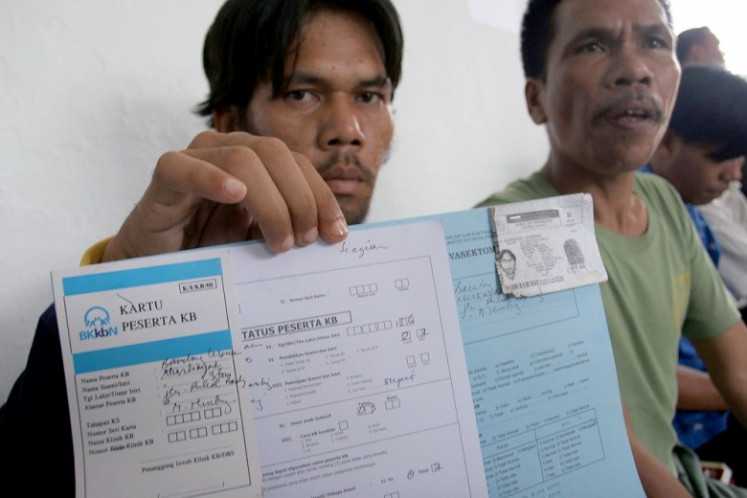Cut off: Indonesian men struggle to access vasectomies
21 September, 2021

Vasectomies remain unpopular and difficult to access in Indonesia.
“‘What if something happens to one of your kids? If that’s the case, you could still have more children,’” 34-year-old tax specialist Rahan Galileo recalled his doctor as saying before declining to perform a vasectomy on him.
“I mean, even in the worst-case scenario where I lose one of my children, there’s no way [I’d be willing] to add a ‘replacement’ kid,” Rahan said.
Rahan, who lives in Depok, West Java, began seeking a vasectomy in 2016, after his wife became pregnant with their third child.
“Intrauterine devices [IUDs] can cause discomfort, while hormonal birth control could have a bad effect on [my wife’s] body. It’s too high risk. I don’t want her to be unsafe with her own body,” he said.
Rahan’s pursuit of the procedure is not typical in Indonesia.
According to a 2019 survey from the National Population and Family Planning Board (BKKBN), vasectomies account for 0.2 percent of the contraceptive methods used in the country. In 2018, the BKKBN reported that 90 percent of the people who underwent contraceptive procedures were women.
From 2016 to 2020, Rahan asked nine doctors and they all turned down his request for a vasectomy. They all offered the same justification: He might want more children down the road.
Rahan noted that men who underwent vasectomies were sometimes perceived as wanting to facilitate extramarital affairs.
“If I wanted to [have an extramarital affair], I wouldn’t need a vasectomy. If I wanted to, I could [use other methods of contraception],” he said.
Rahan said he would wait until he turned 35 in December, as has doctors had suggested, before undergoing a vasectomy. Currently, he and his wife rely on other methods of birth control.
“I’m already certain. Early next year, I will get a vasectomy,” he said.
In 2019, Giovani, 27, and Yosa, 33, married in Semarang, Central Java. The couple have decided to remain child-free and have opted to have Yosa undergo a vasectomy.
“I’m very lucky. I’ve found someone who wants to be child-free [like myself] and, on top of that, wants to get a vasectomy,” said Giovani.
But the couple has not encountered a single doctor in Indonesia willing to perform the procedure. The doctors say they must wait until they are both at least 35 years old and have had two children.
“I asked my cousin who lives in Yogyakarta, and he experienced the same thing. In his case, both he and his wife were 35 years old and already had two children. Still, the doctor refused to perform a vasectomy on him,” said Giovani.
Giovani recalled that her cousin and his wife eventually gave birth to a third child. Only then was the doctor willing to perform a vasectomy.
“Perhaps this is because in Indonesia, being child-free and getting a vasectomy is still considered wrong, according to norms and religious beliefs,” Yosa said, adding that according to the couple’s research, vasectomies were much safer than tubectomies.
Last year, the couple finally found a doctor in Thailand who was willing to perform a vasectomy. They booked an appointment and planned to pair it with a vacation.
“But then the COVID-19 pandemic happened, so the plans were scrapped,” he said.
Entrenched attitudes
“In the past, vasectomies were considered haram because of a lack of knowledge – because they were considered permanent,” said Dr. Nur Rasyid, a urologist and the former chairman of the Indonesian Steady Contraceptives Association (PKMI).
In 2012, the Indonesian Ulama Council changed its policy on vasectomies, permitting them provided they followed sharia principles. While many urologists in Indonesia remained opposed to vasectomies, Nur Rasyid said, he and some of his colleagues had changed their policies in accordance with the council’s decision.
However, he added, vasectomies remained unpopular because men were often “selfish” when it came to contraception, preferring that their wives undergo contraceptive procedures, “even though tubectomies are more complicated and difficult than vasectomies”.
When asked about the BKKBN’s advice on vasectomies, Nur Rasyid said the agency did not want to create controversy. He said the agency suggested that couples have at least two children – with the youngest aged at least 5 years old – before the husband gets a vasectomy.
“However, we can’t ignore the sociocultural development where more and more people are deciding not to have any children from the start. I personally respect that,” he said.
Nur Rasyid noted that if a couple’s request for a vasectomy was turned down, it could lead to unwanted pregnancy with limited options.
“Abortions have a higher risk, not to mention the ethical debates,” he added.
Nur Rasyid recalled that he once had a 21-year-old patient who was not yet married – but had a girlfriend – who wanted to get a vasectomy. He had agreed to perform the procedure on the young man, noting that he was an adult and had made up his mind.
“The procedure is simple and can be done even by a trained general practitioner. While [vasectomy reversal] is a little bit difficult, it is technically possible. That is our job as urologists,” he said.
Source: www.thejakartapost.com
TAG(s):
